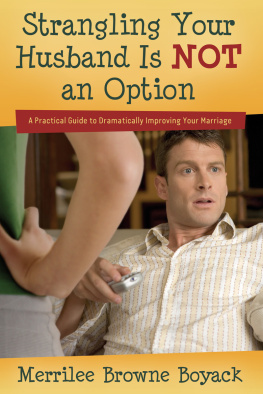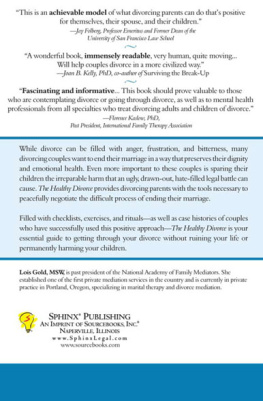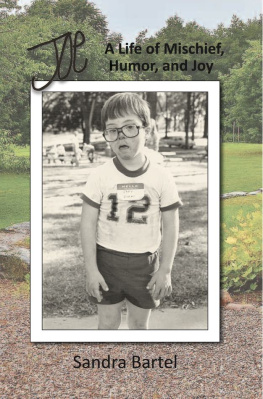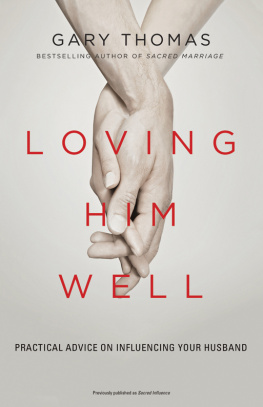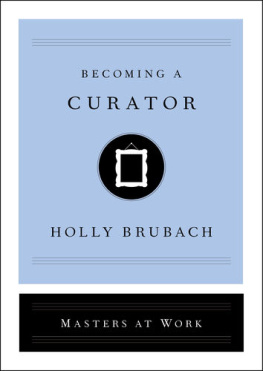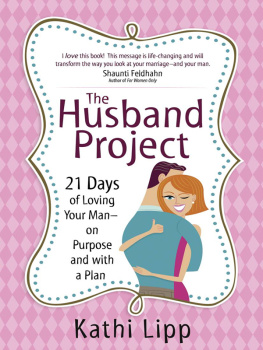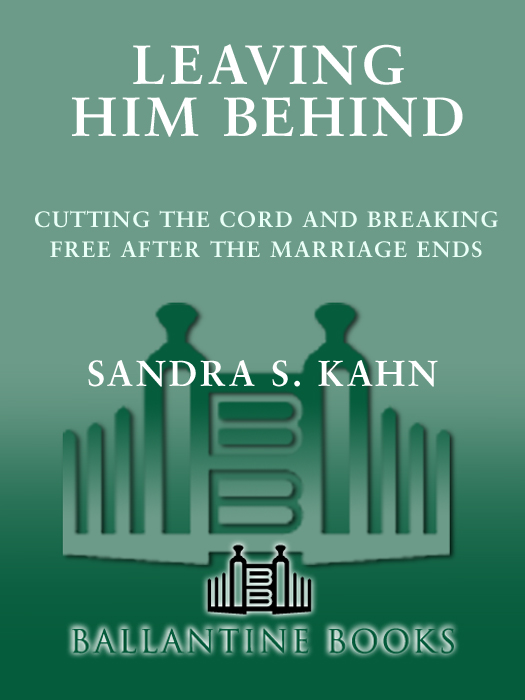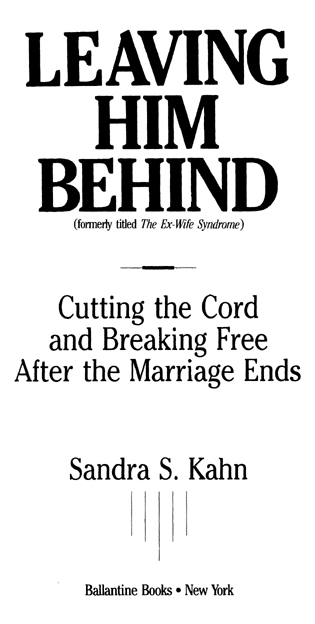ALSO BY SANDRA S. KAHN
(with Jean Davis)
The Kahn Report on Sexual Preferences
Copyright 1990 by Sandra S. Kahn
All rights reserved under International and Pan-American Copyright Conventions. Published in the United States by Ballantine Books, a division of Random House, Inc., New York, and simultaneously in Canada by Random House of Canada Limited, Toronto.
This edition published by arrangement with Random House, Inc.
Originally titled The Ex-Wife Syndrome.
http://www.randomhouse.com
Library of Congress Catalog Card Number: 91-92159
eISBN: 978-0-307-80534-8
v3.1
This book is dedicated
to the memory of my nephew,
Richard Warner.
A UTHORS N OTE
The people described in this book are all individuals or composites of individuals drawn from my files. To protect the privacy of my patients and interviewees, all names and identifying details such as age, occupation, and location have been altered.
A CKNOWLEDGMENTS
First and foremost, I want to express my warmest appreciation to Suzanne Lipsett for the professional skills, percepiiveness, sensitivity, and sense of accuracy that she contributed to this project. Her superb writing abilities added greatly to the quality of this book.
I would like to thank my assistant, Norine Siegel, for her total commitment in assisting me with all aspects of the manuscript. I am also grateful to Norine for sharing her personal experiences with me. They have been inspirational.
I would also like to thank Jack Kahn for his support and Bonny Barezky and Cindy Warner for reading and discussing the chapters with me as they developed.
I am forever grateful to Brenda Clorfene Solomon, M.D., for always being available to explore issues and offer encouragement.
To my agent, Barbara Lowenstein, goes my gratitude for her help and support and to Lou Weber my thanks for pointing me in the right direction. A special thank-you to my editor, Becky Saletan. This book has benefited greatly from her wise advice, skill, and enthusiasm.
Finally, I am grateful to the many women who cannot be thanked by name. These are the women who have shared their personal experiences and feelings with me. Their generosity and openness have contributed to this book.
Contents
Introduction
Slowly, like a building tidal wave, the figures on divorce keep mounting. In the course of the eighties, we were first dismayed and then alarmed to learn that fully half of all marriages in the United States would end in divorce. As we begin the nineties, the dramatic and troubling truth is that this figure is unquestionably here to stay.
The amount of pain, confusion, and emotional turmoil hidden behind that figure is absolutely staggering. But even more disturbing is the duration of the disruption. Most people, including many mental health professionals, would like to believe that after a year or so following divorce the crisis fades and the separated spouses find new paths to take, but the facts are often otherwise. As Judith Wallerstein and Sandra Blakeslee have written in Second Chances, their landmark long-term study of divorced families, the punches keep coming, consequences keep unfolding, even years after the divorce is final. Many people do recover and go on to more satisfying lives. But a large proportion of divorced peoplea proportion we can only guess at, since it has yet to be measurednever quite mend.
This book is written to all women everywhere who are struggling to recover from the trauma of divorce, whether they went through it last week, last year, or a decade or two ago. It is not a book about going through divorcealthough much that we will explore will be helpful to those who are in the midst of divorce, or even contemplating it. It is not about helping children adjust to divorcealthough, again, it offers much concrete guidance on this subject. And it is not a book about how to live the single lifethough it definitely contains fundamental information about that. Rather, the subject of this book is completing divorcelaying it to rest permanently and then moving onno matter when the divorce itself took place. My goal, quite simply, is to help ex-wives wipe that label from their vocabularies forever and transform themselves into autonomous women deeply engaged in the business of living their liveswho happen to have been divorced some time in the past.
Like most psychotherapists, I often hear stories from different patients that resemble each other. Early in my fourteen-year practice, which has focused primarily on women, I began to realize that many of my divorced clients had strikingly similar tales to tell of their lives after divorce. The men, it seemed, rarely looked back after the divorce was final, but all too often the women, after an initial period of relief and hopeful anticipation, unexpectedly found themselves paralyzed, sitting in a room with the shades drawnmetaphorically, at leastand dreaming about how things used to be. Feeling fragmented and uncertain, they asked themselves why they couldnt pull themselves together.
These werent simply women having a rough time adjusting to new circumstances. These were women who, one, two, threeeven ten, twelve, fifteenyears after theyd gotten divorced, were absolutely unable to begin their lives anew.
Elizabeth is an example. The relief she experienced directly after her divorce quickly gave way to obsessive brooding on the old issues that had divided her and Charles during their marriage. He had always behaved with impeccable courtesy and apparent warmth toward her in public, for example, but at home he had clearly, if nonverbally, conveyed the message that he had no interest whatsoever in conversation with hernot about the children, not about the house, and above all not about money. Furthermore, he had made many decisions that directly affected her without breathing a word to her about them. In fact, midway through the marriage he had actually bought an apartment in town and put their house up for salewith no mention to Elizabeth until after the fact. At the time she had been just as glad to be free of the anxiety she often felt around decision making, but now she replayed this and a dozen other incidents repeatedly. Each time she grew so incensed that the next time she saw Charles shed immediately pick a fight.
Yet Elizabeths divorce, five years in the past, was ancient history as far as she was concerned. She came into therapy because she felt her life lacked focus. But as she spoke she gradually revealed that indeed her life did have a focus. She never got very far into recounting an anecdote without making reference to Charles, and she rarely got through a therapy session without coming up against a brick wallsome unresolved conflict with Charlesthat was standing between her plans for herself and her execution of those plans. Far from leaving Charles behind with the divorce, Elizabeth had virtually guaranteed him a central role in her current life.
The more carefully I listened to Elizabeth and my other divorced clients, and the more I compared their case histories, the more certain I became that in one way or another these women were still emotionally connected to their ex-husbands and that this unbroken, unexamined link was the source of both their paralysis and their extreme emotional distress.


